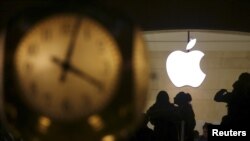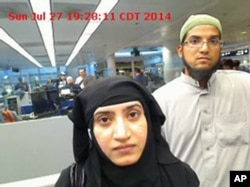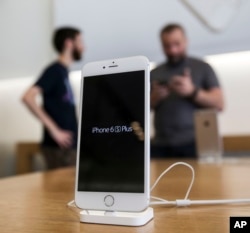A new survey in the United States shows that a majority of Americans support U.S. law enforcement officials in their effort to force technology giant Apple to find a new way to search the encrypted phone used by one of the shooters in last year's massacre in San Bernardino, California.
The Pew Research Center said Monday that its survey of more than 1,000 people in recent days showed that 51 percent of them say Apple should unlock the iPhone used by Syed Rizwan Farook. Thirty-eight percent sided with the company's position that unlocking his phone could eventually endanger the security of the information iPhone users have on their devices. Eleven percent had no opinion.
Meanwhile, a lawyer representing some of the relatives of the 14 people killed by Farook, an American-born Muslim, and his Pakistani wife, Tashfeen Malik, said he would soon file a statement supporting a judge's order requiring Apple to build a backdoor into Farook's cell phone.
Apple is continuing its fight against the order, with chief executive Tim Cook on Monday telling the firm's customers that the U.S. government's demands are "chilling."
In an open letter to millions of its customers, Cook said the technology giant has "no sympathy for terrorists." But he said that if Apple complies with the request of U.S. law enforcement authorities to build a path into the iPhone used by Syed Rizwan Farook, it would also open the door to countless other searches of Apple customers' phones in the future.
Such an intrusion, Cook said, would leave Apple users vulnerable to searches of their financial and health records and monitoring of their location and the pictures they take.
"No reasonable person would find that acceptable," Cook said.
Apple vs. FBI
Apple's fight to block the U.S. Justice Department's demand that it create a way into the phone given to Farook by his employer returns to a federal courtroom Monday.
A magistrate judge said last week Apple must provide software to allow the Federal Bureau of Investigation to guess the password on an iPhone given to Farook, an American-born Muslim, before he and his Pakistani wife, Tafsheen Malik, carried out the San Bernardino attack.
But Apple rejected what it called the "unprecedented" order to create a backdoor that could allow someone with the software to access any iPhone and put its customers at risk of hacking.
The government responded with a motion to make Apple comply. Ahead of Monday's hearing, FBI Director James Comey insisted the government is not trying to set any precedent for future cases or "set a master key loose on the land," which Cook contends is exactly what would happen.
Comey said "it is about the victims and justice," and that the tensions between privacy and safety should not be resolved by corporations or the FBI, but rather the American people.
Cook said that if the FBI wins the case and forces Apple to create a backdoor into its iPhones, law enforcement agents from throughout the U.S. "have already said they have hundreds of iPhones they want Apple to unlock."
Feared abuse of 'powerful tool'
He said Apple believes "the only way to guarantee that such a powerful tool isn't abused and doesn't fall into the wrong hands is to never create it." Cook also suggested the formation of a "commission or other panel of experts on intelligence, technology and civil liberties to discuss the implications for law enforcement, national security, privacy and personal freedoms,” adding that Apple would take part in such an effort.
The case is the latest to showcase the frustrations of law enforcement officials who complain that newer encryption methods used by companies like Apple make it harder to carry out investigations involving the use of technology by criminal suspects. Apple strengthened encryption of its phones in 2014 amid increased public concern about digital privacy.
In the San Bernardino case, the problem is that authorities do not know the password to unlock the iPhone, and the operating system on the phone is set up to automatically erase its data after 10 incorrect password guesses. The court order calls for new software to bypass that feature, or for Apple to provide another way for the FBI to get in.
Critical data
The government's motion that led to Monday's hearing says the phone may have "critical communications and data" they have yet to uncover, may only be found on the phone and cannot be accessed by other means.
Cook says the company has given the FBI any relevant data it possesses, complied with all legal subpoenas and search warrants, and has made its engineers available to give advice to federal investigators.
But he blamed government investigators for hindering their own probe.
"One of the strongest suggestions we offered was that they pair the phone to a previously joined network, which would allow them to back up the phone and get the data they are now asking for," Cook said. "Unfortunately, we learned that while the attacker’s iPhone was in FBI custody, the Apple ID password associated with the phone was changed. Changing this password meant the phone could no longer access iCloud services."















